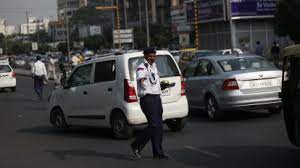
The Goa government has announced a major change in its traffic enforcement policy, restricting the issuance of on-the-spot challans to only inspector-rank police officers wearing body cameras. Chief Minister Pramod Sawant made the announcement on Friday, citing concerns raised by the public about alleged harassment and corruption by traffic police officers.
New Traffic Enforcement Rules
Under the new directive, only police inspectors equipped with body cameras will be allowed to issue physical spot challans during daylight hours. At night, both police sub-inspectors and inspectors will be authorized to issue challans, but only if they are wearing body cameras.
“No one else from the police department will be allowed to issue challans. Besides that, no one will be stopping vehicles for issuing physical challans,” Sawant stated.
However, the existing system of online challans will continue. Traffic violations captured through dash cameras, signal cameras, and other AI-based systems will be processed digitally, with fines sent directly to the violator’s address.
Action Against Tourists Cooking in Public Spaces
Alongside traffic law enforcement, Sawant also announced stricter measures against tourists cooking on roadsides and beaches. The government will now confiscate gas stoves and cylinders found in tourist vehicles to prevent littering and public nuisance.
“Tourists unnecessarily cook and eat at the beach and along the roadsides, making the place dirty and leaving a mess. If they are found engaging in such activities, they will be prosecuted, and their buses or vehicles will be impounded,” Sawant warned.
The new regulations are part of the Goa government’s efforts to streamline law enforcement, improve transparency in traffic policing, and maintain cleanliness in the state’s popular tourist destinations.
Public Reaction and Implementation
While some citizens have welcomed the move as a step towards reducing corruption, others have expressed concerns about how effectively the new rules will be implemented. The government is expected to closely monitor the impact of these measures and make further adjustments if necessary.
Sources By Agencies




